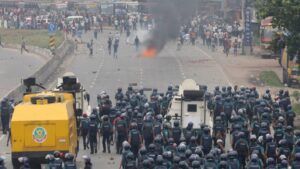
A leader of one such breakaway group openly admitted that, following the unsuccessful protest on October 28, they faced two options: either to withdraw and remain silent or to actively participate in the political process within the parliamentary system. The defectors have opted for the latter, a decision that appears to have weakened the opposition’s campaign, as indicated by the response of many social media activists.
The motivation behind these defections remains unknown, but leaked audio clips attempting character assassination of the defectors suggest a political tactic to lure some dissidents into the electoral loop with the hope of legitimising the forthcoming national election. One thing is clear, though: the utilisation of defectors in the national election restricts the choices available to the electorate. This manipulation of the system conceals a lack of genuine political competition and democratic processes. A barrage of false information and disinformation further sways voters’ perceptions of their options.
Social media plays a pivotal role in the current electoral landscape. In a country where democratic institutions have lost credibility due to overtly partisan stances, social media serves as a surrogate platform for organising social movements and activism. While it offers a space for citizens to express grievances and coordinate protests, it also poses risks such as the spread of misinformation, coordination of malicious activities, and promotion of divisive narratives that may undermine national interests.
Divisive narratives contribute to the creation of echo chambers, where individuals are exposed primarily to information aligning with their existing beliefs. This insular environment hampers the healthy exchange of ideas, leading to rapid emotional reactions and hasty judgements of political figures without a thorough examination of facts. We hear the rants of exiled activists, thinking they have a better understanding of our political reality from their vantage point. We are too close to our own reality to see what is unfolding around us. When we speak, we hear our own interior monologues, as no dialogue is possible in a world gripped with the fear of paranoia, suspicion, and surveillance.
The transformation of a leader with a previously untarnished image, admired for religious convictions and conceptual clarity, makes us wonder about the space left for any form of dissent. The gracefully decorated war hero now faces potential disgrace due to his shift in political allegiances. This shift is likely to be subjected to a trial by social media, with selective scandals used to tarnish the individual’s political career. The incident raises concerns about the message conveyed to first-time voters. There is no place for ideologies, only self-interest and opportunism. What option does a first-time voter have?
A national cricketer with no prior political engagement, a retired bureaucrat with the track record of serving the establishment, a uniformed man freshly off his national duties, a university professor buoyed by his ability to manage student politics—all of them have one goal in common: a ticket to power. It seems the location of power has shifted from the people to the policymakers. And everyone wants it easy. Everyone is dressed up to treat or trick.
